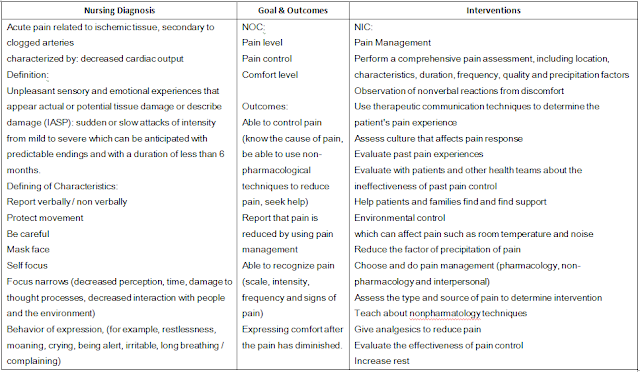Nursing Diagnosis :
Acute pain related to ischemic tissue, secondary to clogged arteries
characterized by: decreased cardiac output
Definition:
Unpleasant sensory and emotional experiences that appear actual or potential tissue damage or describe damage (IASP): sudden or slow attacks of intensity from mild to severe which can be anticipated with predictable endings and with a duration of less than 6 months.
Defining of Characteristics:
- Report verbally / non verbally
- Protect movement
- Be careful
- Mask face
- Self focus
- Focus narrows (decreased perception, time, damage to thought processes, decreased interaction with people and the environment)
- Behavior of expression, (for example, restlessness, moaning, crying, being alert, irritable, long breathing / complaining)
- Changes in appetite and drinking
NOC:
- Pain level
- Pain control
- Comfort level
Outcomes:
- Able to control pain (know the cause of pain, be able to use non-pharmacological techniques to reduce pain, seek help)
- Report that pain is reduced by using pain management
- Able to recognize pain (scale, intensity, frequency and signs of pain)
- Expressing comfort after the pain has diminished.
NIC:
Pain Management
- Perform a comprehensive pain assessment, including location, characteristics, duration, frequency, quality and precipitation factors
- Observation of nonverbal reactions from discomfort
- Use therapeutic communication techniques to determine the patient's pain experience
- Assess culture that affects pain response
- Evaluate past pain experiences
- Evaluate with patients and other health teams about the ineffectiveness of past pain control
- Help patients and families find and find support
- Environmental control
- which can affect pain such as room temperature and noise
- Reduce the factor of precipitation of pain
- Choose and do pain management (pharmacology, non-pharmacology and interpersonal)
- Assess the type and source of pain to determine intervention
- Teach about nonpharmatology techniques
- Give analgesics to reduce pain
- Evaluate the effectiveness of pain control
- Increase rest
- Collaborate with your doctor if there are complaints and the action of pain is unsuccessful

